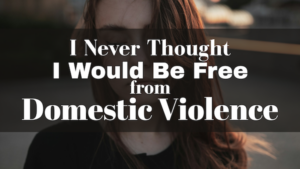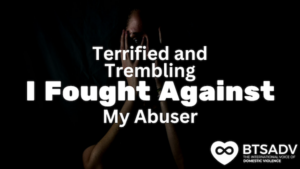By Mary Beth Koenes
“If you are trapped at home with an abusive partner — first, don’t let COVID-19 keep you from seeking services. Shelters, local providers, and hotline services are still open.” –Deborah J. Vagins, the president and CEO of the National Network to End Domestic Violence (NNEDV)
Domestic violence is on the rise with COVID-19. More families are experiencing hostile and life-threatening home environments as a result of the pandemic restrictions.
Those of us who are currently experiencing or have experienced intimate partner violence (IPV) in the past don’t have to read reports to understand the cycles of abuse. We live(d) them. We know how stress, disruption of routine, unemployment, boredom, and financial strain can lead to a volatile home environment. COVID-19 is no different than any other major national (or global) crisis, bringing increased danger for victims who are being forced to spend more time at home with their abusers due to the pandemic. Not only have many victims lost their safe outlets for time away from their abusers–through work, school, travel, etc.–but tensions are high with all the uncertainties of coronavirus, putting them at higher risk of experiencing abuse. Alcohol and substance abuse have increased along with abusers tactics for coercion, control, and dominance. This can be a lethal combination.
Some of the compounding factors happening with the pandemic will raise victims’ dependency on their abusers, which inevitably elevates the risk of violence. Maclen Stanley notes that “IPV surges in times of natural disasters and crises. We previously witnessed this ugly social phenomenon during Hurricane Harvey in 2017, and we will see it again during whatever form of Armageddon brings the nation to its knees on the next go-around.”
COVID-19 has brought the world to its knees and simultaneously caused a spike in domestic violence. Organizations in some states, like Hawaii, have added text hotlines for victims to seek help if it isn’t possible to make a phone call safely in their homes. Hawaii’s Domestic Violence Action Center contacted every survivor they had in their system to make sure each of them had a safety plan in place and knew how to get help if and when they might need it. The National Coalition Against Domestic Violence (NCADV) has released a comprehensive guide for domestic violence organizations across the country to utilize as they assist their community organizations and victims of abuse.
The effects of the shelter-in-place, the fear of developing COVID-19, and the instability of mental, emotional, and physical health as a collective are beginning to rear their heads now that we are a few months into the pandemic. So, what can we do? Where is our power to cope, heal, help? As individuals, each of us carries so much power. The power to listen, ask questions, learn, share, and speak up to protect each other. The most important steps we can take are to open our eyes to signs of distress and safely inquire about our loved ones’ well-being. There is no action too small. So, wherever you are in the wake of the pandemic, think about what time, donations, support, or efforts you can extend to your local shelters, organizations, and hotlines that are already actively and knowledgeably keeping families safe.
One positive piece in this dual pandemic is that even with increased risk factors due to COVID-19, job closings, and shelter-in-place orders over the last few months, domestic violence prevention organizations and their teams of staff and volunteers are still working around the clock to keep families safe in America. Research and reports are being released regularly to keep our communities informed because some things never change when it comes to IPV–it’s happening and each of us, at a minimum, can reach out, ask questions when we suspect abuse, and offer support in any number of ways. Monetary donations are crucial during these times of crisis, as well as volunteering to answer hotlines, donating household items to families executing safety plans, and spreading awareness about organizations, safety tips, and signs of violence to be aware of on social media and word of mouth.
“We are in this together.” This message is being spread more now than ever. So, let’s talk, share, give wherever we can to help stop domestic violence in each of our communities. Every action we take makes an impact. Show up however you can to help support families and victims during the wake of the pandemic.
If you or someone you know is in an abusive relationship, there is help. You can visit the Break the Silence Against Domestic Violence website at www.breakthesilencedv.org or chat with one of our helpline advocates at 855-287-1777.
========
Share Your Story
Sharing our stories can be incredibly empowering while also helping others connect with survivors who have similar experiences. If you are inspired to share your story with us, submit here. You can choose to remain anonymous.
You can also donate to BTSADV here.









